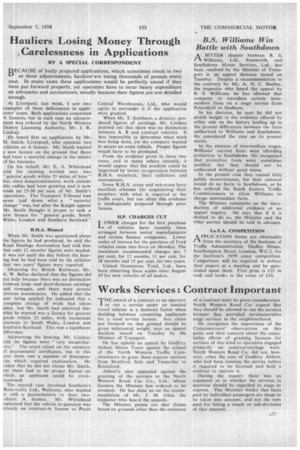Hauliers Losing Money Through Carelessness in Applications
Page 29

If you've noticed an error in this article please click here to report it so we can fix it.
BY A SPECIAL CORRESPONDENT
BECAUSE of badly prepared applications, which sometimes result in two or three adjournments, hauliers' are losing thousands of pounds every year. In many cases these applications would be perfectly sound if they were put forward properly, yet operators have to incur heavy expenditure on advocates and accountants, usually because their figures are not detailed enough.
At Liverpool, last week, I saw two examples of these deficiencies in applicants' cases. Both applications concerned A licences, but in each case an adjournment was brdered by the North Western Deputy Licensing Authority, Mr. J. R. Lindsay.
He heard first an application by Mr.
M. Smith, Liverpool, who operates two vehicles on A licence. Mr. Smith wanted a new licence on the ground that there had been a material change in the nature of his business.
On his behalf, Mr. E. A. Whitehead said the existing normal user was general goods within 25 miles of base but, since denationalization, work outside this radius had been growing and it now made up 25-30 per cent. of Mr. Smith's operations. The Transport Tribunal had never laid down what a "material change" was, but after the Knight appeal Mr. Smith thought it proper to seek a new licence for "general goods. South Wales, London and Southern Scotland."
R.H.A. Blamed When Mr. Smith was questioned about the figures he had produced, he said the Road Haulage Association had told him that only 12 months' figures were needed. It was not until the day before the hearing that he had been told by his solicitor that two years' figures were required.
Objecting for British Railways, Mr. k. W. Balne declared that the figures did not help because there was no distinction between longand short-distance earnings and tonnages, and there were several obvious inaccuracies. He added that the user being applied for indicated that a complete change of work had taken place, but' Mr. Smith had admitted that what he wanted was a licence for general goods within 25 miles, with occasional journeys to South Wales, London and Southern Scotland. This was a significant difference.
Adjourning the hearing, Mr. Lindsay said the figures were "very unsatisfac'ory." The court relied on the accuracy of accountants' certificates, but in this case there was a number of Viscrepan:ies which required explanation. He sided that he did not blame Mr. Smith, aut there had to be proper figures on which an applicant could be crossntamined.
The second case involved Southern's Removals), Ltd., Wallasey, who wanted o add a pantechnicon to their twotehicle A licence. Mr. Whitehead :xplained that the vehicle in question was tlready on contract-A licence to Pools Central Warehouses, Ltd., who would agree to surrender it if the application were granted.
When Mr. T. Southern, a director, produced figures of earnings, Mr. Lindsay pointed out that there was no distinction between A, B and contract vehicles. It was impossible to determine what work was being done, yet the company wanted to secure an extra vehicle. Proper figures would have to be produced.
From the evidence given in these two cases, and in many others recently,it would appear that the position could be improved by better co-operation between R.H.A. members, their solicitors and accountants.
Some R.H.A. areas and sub-areas have excellent schemes for acquainting their members with what is required at the traffic court, but too often this evidence is inadequately prepared through poor liaison.
H.P. CHARGES CUT
LLOWER charges for the hire purchase of vehicles have recently been arranged between motor manufacturers and certain finance companies. Lower scales of interest for the purchase of Ford vehicles came into force on Monday. The maximum recommended charges are 7 per cent. for 12 months, 11 per cent. for
18 months and 15 per cent. for two years. United Dominions Trust, Ltd., have been observing these scales since August 19 for new vehicles of all makes.
B.S. Williams Win Battle with Southdown
A BITTER dispute between B. S.
Williams, Ltd., Emsworth, and Southdown Motor Services, Ltd., has been resolved by the Minister of Transport ir. an appeal decision issued on Tuesday. Despite a recommendation to the contrary by Mr. A. N. C. Shelley, the inspector who heard the appeal by B. S. Williams, he has allowed that company to introduce certain intermediate fares on a stage service from Petersfield to Stedham.
In his decision, he says he did not attach weight to the evidence offered by either side on the history leading up to the present differences between the fares authorized to Williams and Southdown. He considered the case on its present merits.
In the absence of intermediate stages, Williams' current fares were affording protection to Southdown. He recognized that protective fares were sometimes justified, but they should not be authorized Without good cause.
In the present case they caused little public inconvenience, but their removal would do no harm to Southdown, so he has ordered the South Eastern Traffic Commissioners to allow Williams to charge intermediate fares, The Minister comments on the introduction of additional evidence at an appeal inquiry. He says that if it is desired to do so, the Minister and the other parties should be told in advance.
I.o.T.A. COMPETITION
APPLICATION forms are obtainable from the secretary of the Institute of Traffic Administration, Dudley House, Southampton Street, London, W.C.2, for the Institute's 1959 essay competition. Competitors will be required to deliver their papers at a meeting and be questioned upon them. First prize is £25 in cash and books to the value of £10.




































































































